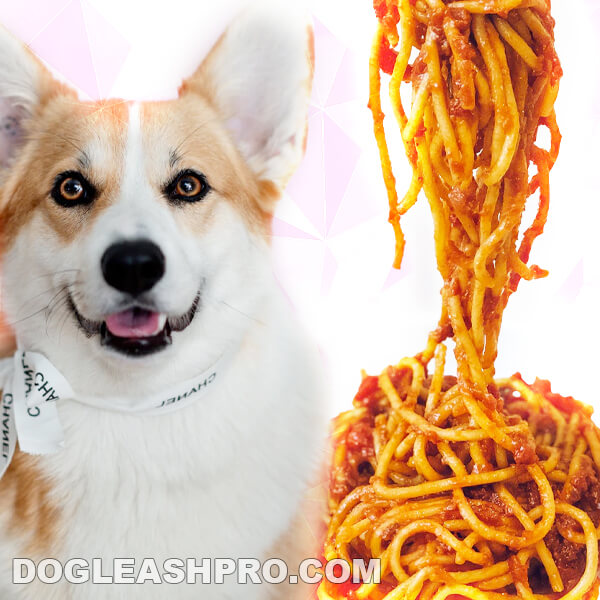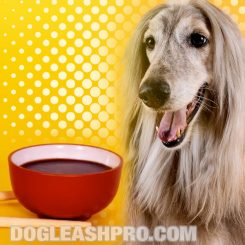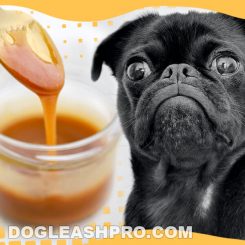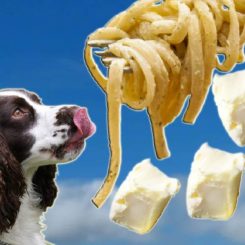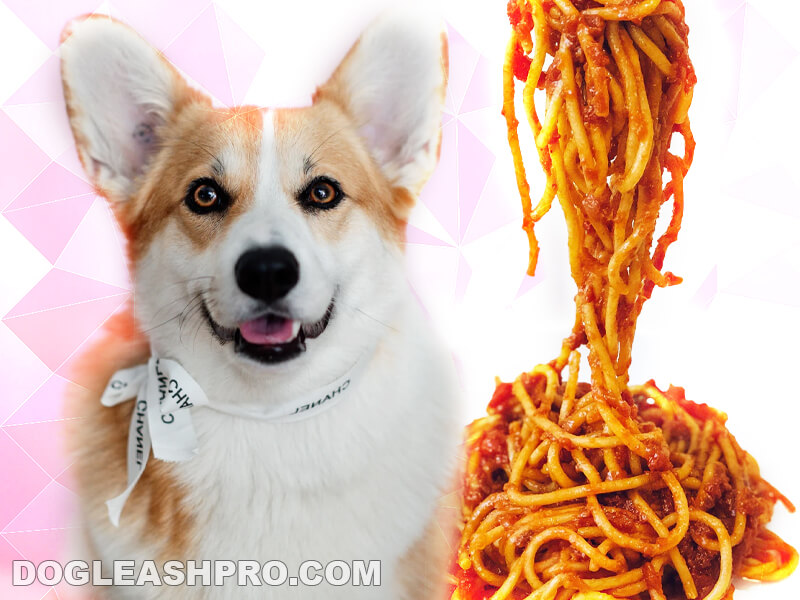
You’re probably thinking about making Pasta for dinner and adding a few spoonfuls of alfredo sauce to it. As you prepare the Pasta meal, your four-legged family members sit patiently waiting and staring at your every move right with big drools dripping out of their mouths. Because they’ve been good all afternoon, you’re thinking of sharing some of your Pasta with them. Now, you’re wondering if Pasta is safe for doggy consumption.
Can Dogs Eat Pasta? Dogs can eat Pasta in moderation if it is plain and cooked. Some vets have suggested that plain uncooked Pasta is fine for dogs too. Pasta is high in carbohydrates, which can cause health issues in dogs if they are fed Pasta regularly. Be careful how much Pasta you’re feeding your canine friends and avoid adding any seasonings like onion, garlic, salt, or any flavoring to the Pasta.
Table of Contents
Can dogs have Pasta?
To fully understand why dogs should only have a moderate amount of Pasta, let’s find out how Pasta can affect your dog’s health if eaten regularly.
Is Pasta good for dogs?
Pasta is good for dogs if it is plain and cooked and your dog does not have a wheat or gluten allergy. Be careful not to feed your furry friends Pasta regularly as it is high in carbohydrates and calories. Both of these combinations can cause weight gain in dogs.
With that said, only feed your pooch Pasta in moderation.
Let’s discuss why plain Pasta is fine for dogs to eat and the main ingredients in Pasta.
Is plain Pasta good for dogs?
Yes, plain Pasta is good for dogs in moderation. Avoid adding any seasoning to the Pasta and keep it plain. Plain Pasta is usually made of three simple ingredients and they are all safe for doggy consumption. We’ll discuss what these three ingredients are next.
Ingredients in Pasta
Whether you’re making the Pasta at home or buying it from your local grocery store, it’s essential to know the ingredients in Pasta in order to understand why plain Pasta is safe for doggy consumption.
What ingredients are in Pasta?
Pasta is generally made from the following ingredients:
- Wheat flour.
- Eggs.
- Water.
Wheat flour is safe for dogs that are not allergic to wheat
If your furry friends are healthy, in perfect condition, and do not have a wheat allergy, then wheat flour and wheat is fine for them to consume.
In fact, many commercial dog foods and canned dog foods actually contain wheat flour in order to make the food more dense and bulky. Wheat flour is one of the most common types of flour that’s usually used in low-quality dog food.
However, that does not mean that wheat flour is the best type of flour for our canine family members. Instead of wheat flour, opt for healthier types of flour such as the following that will not cause your furry K9 friends any digestive issues:
- Coconut flour.
- Pea flour.
- Tapioca flour.
- Chickpea flour.
- Lentil flour.
You may be interested in: Can Dogs Eat Tapioca? Is Tapioca bad for dogs?
Avoid refined wheat flour because the process of making refined wheat flour removes both the bran and the germ, which contains essential nutrients. Instead, refined wheat flour only contains the endosperm, which only gives the refined wheat flour its fine smooth texture and longer shelf life.
While it is true that minerals and vitamins (more specifically iron and folic acid) are added back to the refined wheat flour to make it healthier, it’s just not the same as whole wheat flour.
Eggs are great for dogs
Eggs are safe for dogs to eat and they are a great source of protein for dogs. In addition, cooked boiled eggs contain fatty acids and vitamins. Our furry pooch will receive the following nutrients from eggs:
- Iron.
- Folate.
- Protein.
- Fatty acids.
- Riboflavin.
- Selenium.
- Vitamin B12.
- Vitamin A.
These nutrients help improve your canine friends’ skin and coat. Your dog’s coat will be shinier, silky smooth, and healthy. Their skin will also be healthy, soft, and moisturized.
If you’re giving your pups fried eggs, be sure to use dog-friendly oil such as sunflower oil, olive oil, coconut oil, and flaxseed oil. These types of oil provide your dog with good fat and give them healthy and shiny skin and coat.
Ingredients in Barilla Pasta
If you’re wondering whether dogs can eat Barilla Pasta, let’s take a look at the ingredients:
- Semolina (wheat).
- Durum wheat flour.
The durum wheat flour contains these vitamins and minerals:
- Vitamin B3 (niacin).
- Vitamin B1 (thiamine mononitrate).
- Vitamin B2 (riboflavin).
- Folic acid.
- Iron (ferrous sulfate).
Durum wheat flour is safe for canines that do not have a wheat allergy
If your canine pooch is allergic to wheat or gluten, then durum wheat flour can be harmful to dogs. If your pooch is healthy and does not have any allergy, then she can safely consume durum wheat flour.
However, make sure to feed your pooch wheat in moderation and do not include any Pasta sauce. If you would like to learn more about which type of Pasta sauce is unsafe for dogs, scroll to the middle of this article.
We spoke with our dog’s veterinarian, and he suggested that it’s best to only give your pooch 1 or 2 cooked plain Pasta a week. At max, you can feed your pooch just one cup of Pasta and no more than that. Any more than this can cause health issues such as obesity in dogs from the high carb.
If your K9 family member is prone to obesity such as Toy Terrier, York, Schitz, or Pug, then they should avoid Semolina (wheat).
Fun Fact: Lasagna noodles share the same ingredients as Pasta. Check out Can Dogs Eat Lasagna? to find out Lasagna is safe for dogs.
Can dogs eat whole wheat Pasta?
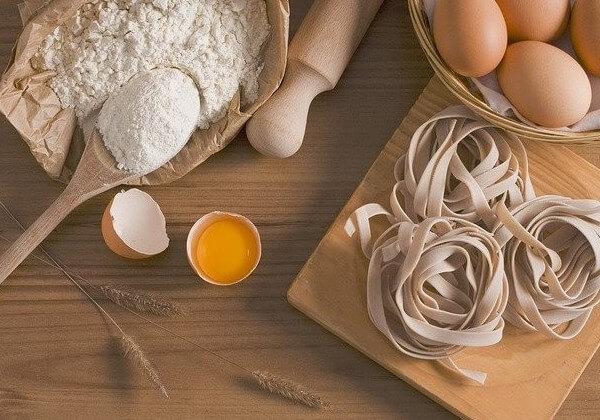
Yes, dogs can eat whole wheat Pasta if they are healthy and are not allergic to whole wheat or wheat products. If you must feed your pooch wheat flour, it’s best to go with whole wheat flour because, unlike refined wheat flour, whole wheat flour contains both natural fiber and nutrients. The fiber comes from the bran and the germ contains nutrients such as nutrients and B vitamins. Overall, whole wheat flour provides health benefits that refined wheat flour does not.
While whole wheat flour is fine for doggy consumption, eating too much of it can be harmful to our K9 friends. Moderation is key here since flour isn’t a necessary food for dogs. Our four-legged family members do not need flour in their diet at all.
If your pooch has the following condition, please avoid feeding them wheat flour or wheat:
- Skin irritation.
- Patchy flaky itchy skin from wheat.
- Frequent diarrhea or vomiting.
- Digestive issues
- Ear infection.
We highly recommend that you bring your furry friends to the vet for a check-up to see if they are allergic to wheat, wheat flour, and wheat products. The vet will perform a series of tests to confirm whether your pooch is allergic to wheat.
Can dogs eat gluten free Pasta?
Let’s now take a look at the ingredients in gluten free Pasta to find out if this type of Pasta is safe for doggy consumption.
Ingredients in gluten free Pasta
If we take a look at the Barilla gluten-free Pasta, the ingredients in this gluten-free Pasta includes:
- Corn flour.
- Rice flour.
- Mono and diglycerides.
A gluten free Pasta means that there is no wheat product in this Pasta. Gluten free Pasta is usually made from the following types of grains:
- Corn.
- Buckwheat.
- Quinoa.
- Millet.
- Rice.
Sometimes, gluten free Pasta is made with amaranth flour, which we believe is one of the best gluten-free substitutes for wheat and other grains as it contains fiber, protein, and all nine amino acids!
In the case of Barilla gluten free Pasta, they use cornflour and rice flour.
Corn flour is a safe alternative for dogs with a gluten allergy
Many owners will use cornflour as one of the ingredients in their homemade dog treats if their furry family members have gluten allergies.
While corn flour is safe for doggy consumption, it does not provide much nutritional benefit or value for dogs. Many dog food manufacturers use cornflour as a thickener in many dog foods. If you must, corn flour is fine, but there are plenty of other types of flour that are better for dogs such as amaranth flour.
Rice flour is another alternative for dogs that are allergic to wheat products
If your furry family member is allergic to wheat or has a gluten allergy, you could use rice flour as a substitute for wheat flour. Rice flour is safe for doggy consumption.
Mono and diglycerides – be wary as they may not be good for doggy consumption
Since Barilla gluten-free Pasta contains mono and diglycerides, we advise that you avoid feeding this Pasta to your pooch. Many vets have suggested that mono and diglycerides have caused obesity and heart issues in dogs and it is not a safe ingredient for our pups.
As you can see, gluten free Pasta may not be good for our pooch. While gluten free Pasta varieties are safe and healthy for humans, the same can’t be said for our four-legged friends. These gluten-free Pasta alternatives could cause heart disease in canines.
How much Pasta is okay for dogs?
In small amounts, plain Pasta without any seasonings or flavorings is okay for dogs. A small amount of Pasta can provide your K9 friends some health benefits, however, eating too much plain Pasta can be detrimental.
Sometimes dog owners (including myself) worry about dropping a piece of food onto the kitchen floor that may be harmful to our pooch. Fortunately, when it comes to Pasta, canine owners do not have to worry about dropping the noodle or pasta. One or two noodles or Pasta won’t harm your pooch, but be sure to avoid giving your canine family member a whole plate of Pasta.
Regularly feeding your furry family members Pasta can cause these health issues in dogs:
- Canine obesity due to the high carbs in Pasta.
- Obesity can lead to difficulty breathing, high blood pressure, and affect heart functions.
- When dogs are overweight, they may have joint pain and muscle pain.
- Lethargic or often tired.
- Unmotivated to move around, play, walk, or jump.
Fun Fact: People usually have Pasta with Brussel sprouts. Before you share this vegetable with your pooch, you’ll want to read Can Dogs Eat Brussel Sprouts? first.
Can dogs eat Pasta noodles?
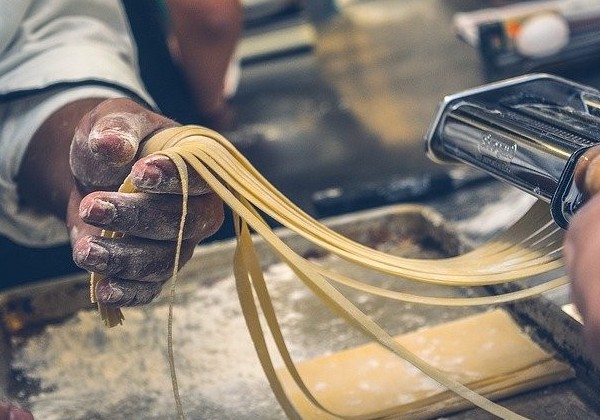
Yes, dogs can eat Pasta noodles in moderation, and if they are not allergic to wheat or gluten products if the Pasta noodle is made of wheat and wheat flour.
The Pasta noodles should be plain, fully cooked, and do not contain any seasonings like garlic, onion, or salt.
Both onion and garlic are toxic to dogs and can cause damage to a dog’s health. If you add these two ingredients to the Pasta, be sure to bring your pooch to the vet immediately. Garlic and onion can damage your dog’s red blood cells and result in your pooch having anemia.
When it comes to your dog’s food, avoid leeks and chives as well because they are part of the Allium species with onion and garlic.
Symptoms of onion and garlic poisoning in dogs include:
- Pale or blue gum.
- Blue or white mucous membrane.
- Lethargy.
- Muscle weakness.
- Loss of appetite.
Can dogs eat Pasta sauce?
Absolutely not, dogs should not eat Pasta sauce. Let’s discuss common Pasta sauces people use for their Pasta:
- Alfredo sauce.
- Tomato sauce.
- Basil pesto.
- Creamy garlic butter sauce.
- White sauce.
Alfredo sauce is not safe for doggy consumption
There are many reasons why alfredo sauce is not good for dogs. If you plan on feeding your pooch Pasta, avoid adding any alfredo sauce to it. Consuming Pasta with alfredo sauce can be harmful to your pup’s health.
Can dogs eat Pasta with tomato sauce?
When it comes to tomato sauce, let’s find out if it’s just as bad as alfredo sauce.
Tomato sauce is dangerous to dogs
Similar to alfredo sauce, tomato sauce is also not good for our furry pooch. Tomato sauce like marinara sauce is made from the following key ingredients:
- Onions.
- Garlic.
- Herbs.
- Tomatoes.
As discussed above, both garlic and onions come from the same Allium plant species and they are toxic to dogs. Tomato sauce also contains a high amount of salt and too much salt consumption can cause sodium-ion poisoning in dogs.
Symptoms of salt poisoning in dogs include:
- Headache.
- Extreme thirst leads to too much water consumption, which leads to frequent urination.
- Dizziness.
- Seizure (in severe cases).
Additionally, dogs don’t need herbs in their diet. Try not to feed your pooch Pasta with herbs like oregano, black pepper, or basil in it.
You might also like: Can Dogs Eat Pepperoni? The Truth!
Can dogs eat plain Pasta?
Yes, dogs can eat plain Pasta and plain Pasta is the best Pasta for our furry friends if they are healthy and not allergic to wheat products. If you have to feed your pooch Pasta, make sure it is plain with no added seasoning, flavoring, or Pasta sauce.
Can dogs eat raw Pasta?
Yes, dogs can eat raw Pasta as the main ingredient is wheat flour, water, and eggs. However, if your pooch is allergic to wheat or has a gluten allergy, please avoid feeding them Pasta made of wheat whether it is cooked or raw.
Moderation is key so avoid feeding your pooch too much raw Pasta. If a raw plain Pasta fell onto the kitchen floor and your four-legged friends slurped it up before you could clean it up, then that’s fine. But do not intentionally feed them so much.
Can dogs eat cooked Pasta?
Yes, dogs can eat cooked Pasta, as long as it is plain without any Pasta sauce such as alfredo and marinara sauce and without any seasonings like oregano, black pepper, or basil.
Can dogs eat squid ink Pasta?
Yes, dogs can safely eat squid ink Pasta. However, since Pasta is not a part of a dog’s diet, dog owners should only feed their pooch squid ink Pasta in moderation. If you accidentally drop a squid ink Pasta on the floor while cooking and preparing your dinner and your four-legged family member sneaks a few squid ink Pasta, they should be fine.
Can dogs eat tuna Pasta?
Yes, dogs can eat tuna Pasta. Both tuna and Pasta are safe for dogs to eat in moderation. However, avoid feeding your pooch too much tuna since tuna does contain mercury and too much tuna consumption can cause mercury poisoning.
Dogs with mercury poisoning will experience the following:
- Kidney failure and damage (swollen abdominal and difficulty urinating).
- Bloody and watery diarrhea.
- Body tremors.
- Nervousness.
- Anxiety.
- Hair loss.
- Loss of sight or blindness.
- Vomiting blood.
- Loss of coordination.
- Inability to feel floor or ground with paws.
You may be interested in: Can Dogs Eat Fish Heads?
Can dogs eat Pasta with butter?
No, dogs should not eat Pasta with butter. The butter in the Pasta is what makes this dish a no-no for dogs. Butter comes from cow’s milk, which makes it a dairy product. If you know your four-legged friends are lactose-intolerant, do not feed them Pasta with butter.
Additionally, butter is usually high in fat and salt, which are dangerous to dogs. Consuming Pasta or any other food that has butter puts your furry family member at risk for canine obesity and even salt poisoning.
Can dogs eat Pasta and cheese?
Yes, dogs can eat Pasta and cheese if they are not allergic to wheat products in the Pasta and are not lactose intolerant as cheese is a dairy product.
However, it’s best to serve your pooch plain Pasta without any additions like cheese. If your pooch accidentally ate a little bit of Pasta with cheese, they should be fine. However, if they eat too much Pasta and cheese and they are lactose intolerant and have a wheat allergy, it’s best to bring them to the vet as soon as possible.
So, Can Dogs Eat Pasta?
While Pasta isn’t exactly harmful to dogs, a large amount of Pasta is. Feeding your pooch a moderate amount of Pasta is key here. We highly advise that dog owners avoid giving their canine friends Pasta on a regular basis. Consistent large portions of Pasta can cause health problems in dogs such as obesity, heart disease, difficulty breathing, and joint pain.
Avoid making it a habit of casually feeding your pups Pasta, but occasionally or every once in a while should be fine.
DISCLAIMER: THIS WEBSITE DOES NOT PROVIDE MEDICAL ADVICE
The information, including but not limited to, text, graphics, images and other material contained on this website are for informational purposes only. No material on this site is intended to be a substitute for professional veterinary advice, diagnosis, or treatment. Always seek the advice of your veterinarian or other qualified health care provider with any questions you may have regarding dietary needs.
Resources:
https://en.wikipedia.org/wiki/Pasta
https://fsi.colostate.edu/flour-draft/

With over five years of specialized experience as an animal writer, my expertise lies in dog nutrition, health, behavior, grooming, and training. I am dedicated to delivering helpful and informative content that caters to the well-being of our furry friends. My primary goal is to empower pet owners with knowledge and ensure our canine companions thrive in health and happiness. In my free time, I love volunteering at local dog rescue centers.
